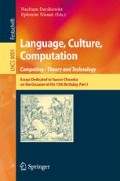Abstract
This paper considers the question of the influence of a coalition of vertices, seeking to gain control (or majority) in local neighborhoods in a graph. A vertex v is said to be controlled by the coalition M if the majority of its neighbors are from M. Let Ruled(G,M) denote the set of vertices controlled by M in G. Previous studies focused on constructions allowing small coalitions to control many vertices, and provided tight bounds for the maximum possible size of Ruled(G,M) (as a function of |M|). This paper introduces the dual problem, concerning the existence and construction of graphs immune to the influence of small coalitions, i.e., graphs G for which Ruled(G,M) is small (relative to |M| again) for every coalition M. Upper and lower bounds are derived on the extent to which such immunity can be achieved.
Access this chapter
Tax calculation will be finalised at checkout
Purchases are for personal use only
Preview
Unable to display preview. Download preview PDF.
References
Alon, N., Spencer, J.H.: The Probabilistic Method. John Wiley & Sons, NY (1992)
Berger, E.: Dynamic Monopolies of Constant Size. J. Comb. Theory, Ser. B 83, 191–200 (2001)
Bermond, J.-C., Bond, J., Peleg, D., Perennes, S.: Tight bounds on the size of 2-monopolies. In: Proc. 3rd Colloq. on Structural Information & Communication Complexity, pp. 170–179 (1996)
Bermond, J.-C., Peleg, D.: The Power of Small Coalitions in Graphs. In: Proc. 2nd Colloq. on Structural Information & Communication Complexity, pp. 173–184 (1995)
Bollobás, B.: Random Graphs. Academic Press (1975)
Bracha, G.: An o(logn) expected rounds randomized Byzantine generals algorithm. J. ACM 34, 910–920 (1987)
Dwork, C., Peleg, D., Pippenger, N., Upfal, E.: Fault tolerance in networks of bounded degree. SIAM J. Computing 17, 975–988 (1988)
Flocchini, P., Geurts, F., Santoro, N.: Optimal irreversible dynamos in chordal rings. Discrete Applied Mathematics 113, 23–42 (2001)
Flocchini, P., Kralovic, R., Ruzicka, P., Roncato, A., Santoro, N.: On time versus size for monotone dynamic monopolies in regular topologies. J. Discrete Algorithms 1, 129–150 (2003)
Flocchini, P., Lodi, E., Luccio, F., Pagli, L., Santoro, N.: Dynamic monopolies in tori. Discrete Applied Mathematics 137, 197–212 (2004)
Garcia-Molina, H., Barbara, D.: How to assign votes in a distributed system. J. ACM 32, 841–860 (1985)
Gifford, D.K.: Weighted voting for replicated data. In: Proc. 7th Symp. Oper. Sys. Princip., pp. 150–159 (1979)
Goles, E., Olivos, J.: Periodic behaviour of generalized threshold functions. Discrete Mathematics 30, 187–189 (1980)
Hall, M.: Combinatorial Theory. John Wiley & Sons, Chichester (1986)
Hassin, Y., Peleg, D.: Extremal Bounds for Proabilistic Polling in Graphs. In: Proc. 7th Colloq. on Structural Information & Communication Complexity, pp. 167–180 (2000)
Hassin, Y., Peleg, D.: Distributed probabilistic polling and applications to proportionate agreement. Information and Computation 171, 248–268 (2001)
Jalote, P., Rangarajan, S., Tripathi, S.K.: Capacity of voting systems. Technical Report UMIACS-TR-91-118, University of Maryland (1991)
Kahale, N.: Eigenvalues and expansion of regular graphs. J. ACM 42, 1091–1106 (1995)
Kutten, S., Peleg, D.: Fault-local distributed mending. J. of Algorithms 30, 144–165 (1999)
Kutten, S., Peleg, D.: Tight fault-locality. SIAM J. on Computing 30, 247–268 (2000)
Lamport, L., Shostak, R., Pease, M.: The Byzantine generals problem. ACM Trans. Programming Languages and Systems 4, 382–401 (1982)
Linial, N., Peleg, D., Rabinovich, Y., Saks, M.: Sphere packing and local majorities in graphs. In: Proc. 2nd ISTCS, pp. 141–149. IEEE (1993)
Luccio, F., Pagli, L., Santoro, N.: Network decontamination in Presence of Local Immunity. Int. J. Found. Comput. Sci. 18, 457–474 (2007)
Moran, G.: On the period-two-property of the majority operator in infinite graphs. Trans. American Math. Society 347, 1649–1667 (1995)
Moran, G.: Parametrization for stationary patterns of the r-majority operators on 0-1 sequences. Discrete Mathematics 132, 175–195 (1994)
Moran, G.: The r-majority vote action on 0-1 sequences. Discrete Mathematics 132, 145–174 (1994)
Peleg, D.: Local Majorities, Coalitions and Monopolies in Graphs: A Review. Theoretical Computer Science 282, 231–257 (2002)
Peleg, D.: Size Bounds for Dynamic Monopolies. Discrete Applied Mathematics 86, 263–273 (1998)
Poljak, S., Sura, M.: On periodical behaviour in societies with symmetric influences. Combinatorica 3, 119–121 (1983)
Poljak, S., Turzik, D.: On an application of convexity to discrete systems. Discrete Applied Mathematics 13, 27–32 (1986)
Sipser, M., Spielman, D.: Expander codes. In: 35th IEEE Symp. on Foundations of Computer Science, pp. 566–576 (1994)
Spasojevic, M., Berman, P.: Voting as the optimal static pessimistic scheme for managing replicated data. IEEE Trans. Parallel & Distr. Systems 5, 64–73 (1994)
Author information
Authors and Affiliations
Editor information
Editors and Affiliations
Rights and permissions
Copyright information
© 2014 Springer-Verlag Berlin Heidelberg
About this chapter
Cite this chapter
Peleg, D. (2014). Immunity against Local Influence. In: Dershowitz, N., Nissan, E. (eds) Language, Culture, Computation. Computing - Theory and Technology. Lecture Notes in Computer Science, vol 8001. Springer, Berlin, Heidelberg. https://doi.org/10.1007/978-3-642-45321-2_8
Download citation
DOI: https://doi.org/10.1007/978-3-642-45321-2_8
Publisher Name: Springer, Berlin, Heidelberg
Print ISBN: 978-3-642-45320-5
Online ISBN: 978-3-642-45321-2
eBook Packages: Computer ScienceComputer Science (R0)

